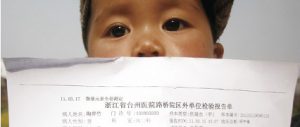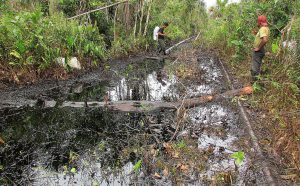Less than 30% of the 2.6 million tonnes of old lead-acid batteries discarded in China every year are properly recycled, according to a new report by the Ministry of Environmental Protection and the US NGO National Resources Defence Council (NDRC).
This is much lower than the 95% figure seen in developed countries. But the problem is not a lack of recycling capacity – firms such as Jitianli in Shanxi can handle 100,000 tonnes of lead-acid batteries a year, yet receive only 15,000 tonnes.
Where do the rest go? According to the report about 80% are bought up by individual traders who sell onto illegal recyclers. This means legitimate firms can’t obtain the batteries they need to operate normally.
The methods used to disassemble lead batteries by illegal recyclers pollutes the air, soil and water. Wang Ying, an NRDC consultant on the management of chemicals, said that “any illegal recycling will be polluting, they all dump the sulphuric acid.” She added that one-third of the weight of a battery is sulphuric acid – the traders dump it for easier transportation, and some recyclers say openly that they only want the lead plates.
Yang Xiaoming, senior engineer at the PRCEE, said that old lead-acid batteries are listed as a type of hazardous waste: there are strict standards for storage and disposal. “But in practice there’s no supervision, so illegal operations do exist and compete with the legitimate firms.”
Yang added that there were many policy loopholes and regulatory failings, and dealing with the problem will require facing up to issues within the entire production, use and recycling system: unclear responsibilities; obstacles to setting up a legitimate recycling system, high licensing barriers, the cross-provincial operations of illegal recyclers, and a lack of joined-up enforcement.
These problems all give rise to the biggest problem faced today – the legitimate recyclers can’t get the batteries. Wan Xuejie, deputy president of Jitainli, explained that his company spent 200 million yuan on importing and upgrading top of the range equipment from Italy. That machinery can extract the acid and metals from the battery, but is costly to run – to earn a profit the company needs to buy in batteries at less than 4,000 yuan a tonne. But smaller operations can pay 7,000 yuan and still make money, so Wan’s firm is losing out.
Yang told chinadialogue that when Shanghai was unable to collect enough batteries to make recycling worthwhile, it had to send those batteries it had obtained to Zhejiang and Jiangsu. But Zhejiang will no longer take them, and they have to be sent to Anhui. “And now Shanghai’s worried Anhui won’t want them either. There are too many of the smaller traders stopping the batteries reaching the legitimate recyclers.”
At the bottom of the chain, Wan explained, are car repair shops and sales lots – they will buy an old battery for 150 yuan and sell the customer a new one. The old one is sold on at a profit to a trader who will in turn sell it on to an illegal recycler.
David Lennet, an attorney to the NRDC, explained that the US once faced the same problem. Under the US system, he said, consumers get a discount on a new battery if they hand their old one in. The retailers pass those batteries back to the manufacturer, in return for a cheaper price on new stock. The manufacturers then pass the batteries onto a recycler – who sells the recovered lead back to the manufacturer at a discount. Operating costs throughout the chain are cut, and everyone benefits.






